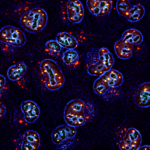Link to Pubmed [PMID] – 12508358
World J. Gastroenterol. 2003 Jan;9(1):89-93
AIM: To find the point mutations meaningful for inactivation of liver-related putative tumor suppressor gene (LPTS) gene, a human novel liver-related putative tumor suppressor gene and telomerase inhibitor in hepatocellular carcinoma.
METHODS: The entire coding sequence of LPTS gene was examined for mutations by single strand conformation polymorphism (SSCP) assay and PCR products direct sequencing in 56 liver cancer cell lines, 7 ovarian cancer and 7 head neck tumor cell lines and 70 pairs of HCC tissues samples. The cDNA fragment coding for the most frequent mutant protein was subcloned into GST fusion expression vector. The product was expressed in E.coli and purified by glutathione-agarose column. Telomeric repeat amplification protocol (TRAP) assays were performed to study the effect of point mutation to telomerase inhibitory activity.
RESULTS: SSCP gels showed the abnormal shifting bands and DNA sequencing found that there were 5 different mutations and/or polymorphisms in 12 tumor cell lines located at exon2, exon5 and exon7. The main alterations were A(778)A/G and A(880)T in exon7. The change in site of 778 could not be found in HCC tissue samples, while the mutation in position 880 was seen in 7 (10 %) cases. The mutation in the site of 880 had no effect on telomerase inhibitory activity.
CONCLUSION: Alterations identified in this study are polymorphisms of LPTS gene. LPTS mutations occur in HCC but are infrequent and of little effect on the telomerase inhibitory function of the protein. Epigenetics, such as methylation, acetylation, may play the key role in inactivation of LPTS.
